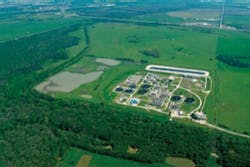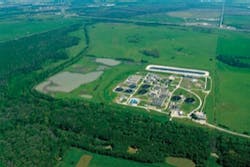Water treatment project at Camp Bucca starts flowing
By Spc. Samuel Soza, 367th MPAD, USD-S PAO
CAMP BUCCA, Iraq, May 4, 2010 -- With the first shovel-full out of the ground April 26, 2010, the U.S. military started a two-week project that will create a network of pipe linking the water and wastewater treatment facilities on Camp Bucca.
Together, the facilities will provide the necessary groundwork for the activation and operation of a new multimillion-dollar water treatment plant that will increase or introduce water to several nearby municipalities including az-Zubayr, Safwan, and Umm Qasr.
"The issue with the [new] water treatment plant is, we don't produce enough grey water to run it, so we're trying to pump fresh water into it," said Capt. Kenneth Ditch, commander for the 606th Forward Support Company, 1st Battalion, 377th Field Artillery Regiment, 17th Fires Brigade, and a native of Lafayette, La.
Col. Dan Lund, Camp Bucca's commanding officer, explained the importance of keeping the water flowing through the microbial filters.
The wastewater treatment plant harnesses Camp Bucca's sewage and creates grey water -- non-potable water that can be used for anything from firefighting, to agriculture, to washing vehicles -- but not enough to operate the new plant by itself.
Camp Bucca's water treatment facilities tap into the region's aquifer -- the ninth-largest in the world -- to create fresh water. This includes an established water treatment facility on post and another operated by KBR, which produces 850,000 gallons per day.
The KBR treatment facility is not permanent, however, and will leave with U.S. forces.
"At the present time, for the operation of the camp, we are probably using about 140-150,000 gallons [of fresh water]," said Lund.
Combined, the water and wastewater treatment facilities will ensure the new plant can operate and keep the microbial filters intact -- a major concern as each filter comes with the hefty price tag of $800,000 -- until municipal pipelines can be connected to supply the necessary operating water flow, Ditch said.
"The new water treatment plant should be [running] in the next 60 days. That will have a capacity of 1.2 million gallons per day," said Lund, a Denver native.
From the new plant, another pipeline will be laid, stretching about a half-mile from Camp Bucca, ultimately joining with existing main lines to flow into the local municipalities.
The pipeline's path has not been resolved yet, but several proposals have been drawn-up.
One plan involves laying the pipe alongside roadways leading from the plant to the cities, but has faced objections from roadway officials who say the pipeline would then prevent the roads from being widened in the future.
However, if the path is extended a bit further from the road, it will be out of the jurisdiction of the roadway officials.
Yet, according to a briefing on the project with Brig. Gen. Randal A. Dragon, 1st Infantry Division deputy commanding general for support, there is confusion as to who is responsible for the property the pipe would then run through.
The Basra Provincial Reconstruction Team has been working with municipal officials to sort out who exactly owns the land at the proposed sites and get authorization to work in the area.
"Around August or September they will have hooked that line up," said Lund.
Following that, the plant will be activated for a two-week test with accompanying evaluations of the filters and equipment by representatives from Aeromix, the U.S. corporation awarded the contract for the plant project in 2007.
Aeromix has worked on past projects in Diwaniyah and Hillah, both large cities located south of Baghdad in United States Division -- South.
The plant will require approximately nine employees to operate, each needing about three months of training. According to the briefing with Dragon, the Iraqi officials plan to have a third party operate the plant until the personnel are trained.
"The plant was initially conceived probably three or four years ago," Lund said. "We are probably eight or nine weeks off from when we have to deliver the plant."
With such a long history, the project has changed hands as service members rotate into and out of country. The networking of the pipes and the activation of the new plant in the coming months are significant benchmarks in a massive project that is important to the area, said Lund.
"Personally, it's been very rewarding -- especially in this part of the country, which probably received less U.S. government and Iraqi government assistance than anywhere else that I know of," he said.
Lund said that the likely reason for this is that after the initial invasion in 2003, the reconstruction momentum hit further north and since the U.S. was the leading country for reconstruction, it focused its resources there.
When the project was conceived, Basra Province was the responsibility of British forces.
"I can't speak to what the British did or didn't do, but this has been very good, in the sense that the people of Umm Qasr are now recognizing the significant contributions that we're making to make things better for their citizens," said Lund.
"I think that by forging that kind of presence, that kind of partnership and understanding with our Iraqi partners, particularly at the end of our time as we prepare to leave the country, is what they are going to remember: some of those last things we did," he said.
Camp Bucca is the former site of a theater internment facility that held more than 22,000 detainees at one point in 2007, and closed down in 2009. To his knowledge, the Camp Bucca TIF was the largest ever in U.S. history, said Lund.
After its closure, the TIF was deconstructed and is now the site of an Iraqi Marine training facility, which will also benefit from the new water treatment plant. The Marine training grounds are slated to return to Iraqi control July 4, 2010.
"Eventually, we're going to hand all this over to the government of Iraq," Ditch said of the new plant.
This transfer must be done responsibly and professionally, said Lund.
"It's our job to take the ball the last few yards and over the goal line," he said, "How well we do that is going to be how the U.S. is remembered by the Iraqis in the future."
###

